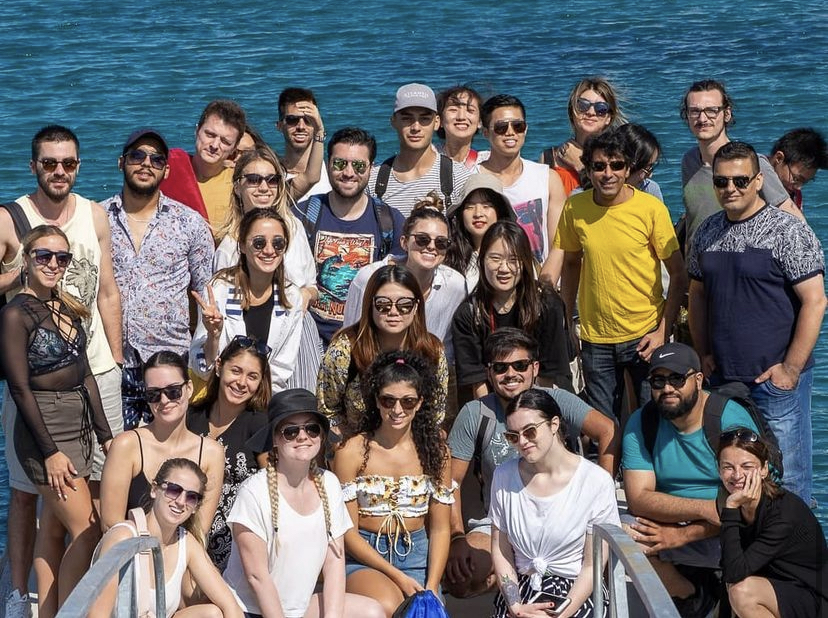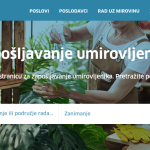Why are people coming to study in Croatia? Safety, lifestyle, affordability, beauty and English-language courses.
This page is written in partnership with the Algebra University College, Croatia’s leading private education institution, offering an array of educational opportunities for international students at the undergraduate, graduate and post-graduate levels.
- Why study in Croatia?
- Study in Croatia: International Courses in English
- Living in Croatia
- Visas and resident permits for study in Croatia
- Meet Algebra University College, Croatia’s leading private education establishment
- Tuition Fees and scholarships for studying in Croatia
- Student life in Croatia
- After graduation?
- More information
Why study in Croatia?
The answer to this question is somewhat similar to the answer to any question of why to come to Croatia at all. It mostly consists of the following: Croatia offers you an amazing lifestyle, exquisite natural beauty, rich cultural and historical heritage, the amalgamation of various cultures mixing in this geographical region, incredible safety and accessibility from Central Europe. Oh, and yes, two additional factors for why deciding to study in Croatia is a good idea: the long, valued academic tradition, and the fact that a majority of people in Croatia (and even more so in the academic environment) speak good English.
Study in Croatia: International Courses in English
There are well over a hundred higher-education institutions all over Croatia, and currently, there are almost a hundred degree courses offered to potential students in English, all over Croatia.
The nine public universities in Croatia (Zagreb, Rijeka, Osijek, Split, Zadar, Dubrovnik, Pula, Slavonski Brod, and Sjever University) offer numerous undergraduate and graduate programmes in English, including various IT programmes, a combined undergrad/graduate programme of medicine, lasting 6 years after which you’re an MD, veterinary medicine etc.
In addition to the programmes at the universities, there are also numerous English-language programmes at the other higher-education institutions. Most of them are IT and business-oriented, so you can find programmes such as digital marketing by Algebra, tourism by VERN’, sports management by Aspira, International business by RIT Croatia, international relations by Libertas and a handful of others.
Ministry of Science maintains a list of all of the programmes by the Croatian higher education institutions, so at this page you can find the list of all of the English-language programmes. You can also find the five programmes offered in Italian at the Pula University and the fact that you can study medicine in German in Osijek!
Living in Croatia
Living in Croatia is an experience quite like no other. One of the safest countries in Europe, visitors fall in love with the relaxed cafe culture lifestyle, authentic experiences and natural beauty.
With over 160,000 students, Croatia is extremely welcoming for foreign students, and there is a very well-developed network of services to cater to student needs. And with that gorgeous Adriatic and over a thousand islands just a bus and ferry ride away, Croatia really does offer the perfect combination of affordable work and play. One other important consideration for the students arriving from any of the other continents is that Croatia is located centrally in Europe, and well-connected to the most interesting cities. Studying and staying in Croatia gives you amazing opportunities to explore most of Europe in your free time.
For an overview of the realities of living in Croatia, check out this honest overview from an expat after 15 years in Croatia.
The life of a student living in Croatia while studying somewhat resembles the life of a digital nomad, so you will probably be able to find much useful advice in our article about digital nomads in Croatia.
Visas and resident permits for study in Croatia
There isn’t a simple answer to the question “do I need a visa to be able to study in Croatia”. As often happens in Croatia, the answer is “probably not, but it’s complicated”. Let get into the details:
If you’re a European Union national, you (obviously) don’t need a visa to come to Croatia. Furthermore, if you’re staying in Croatia for less than 3 months, you don’t really need any further paperwork. If you’re planning to stay for more than 3 months, you will be required to register your temporary stay. All details of this are well-explained on the Ministry of the Interior website.
If you’re not from the EU, there will be a bit more paperwork involved for you. To find out if you need a visa to enter Croatia, go to the Croatian Foreign Ministry website. The doyouneedvisa website also has a lot of valuable information for potential students. If you’re a third party national, you will also need to apply for a temporary stay in Croatia, as per instructions on the Ministry of the Interior website. The temporary stay for the third-country nationals is usually granted for up to a year, and for those studying in Croatia, for the duration of the academic year. Keep in mind that, if you require a visa to enter Croatia, you will need to pay the total tuition fee for the educational programme of your choosing to be able to get the visa, and have proof of additional funds during your stay in Croatia. Additionally, you will have to have health and travel insurance issued in your home country before coming to study in Croatia.
Meet Algebra University College, Croatia’s leading private education establishment
Overview
Established in 1998, Algebra is one of the top Croatian education institutions. It employs over 150 people, with more than 600 educators working with them part-time to provide the best possible education experience. Their headquarters are in Zagreb, but their programmes take place in almost 20 locations. Currently, they offer almost a thousand shorter educational programmes (up to 2 weeks, mostly in Croatian), 50 accredited longer lifelong learning programmes for adults (also mostly in Croatia) and 14 accredited higher education programmes.
Undergraduate courses
Algebra University offers a group of undergraduate programs/specializations which culminate with a Bachelor title. Those are Software Engineering, System Engineering, Multimedia Computing, Digital Marketing, Market Communications Design with specializations in Design, and 3D Design. All of them are also 6-semester programmes offered in English.
Graduate courses
Algebra offers seven graduate professional programmes (also known as “master” programmes), all of which lead to the Professional Master title. Those six are: Software Engineering, System Engineering, Digital Marketing, Creative Market Communications Management, Game Development, Data Science, and IoT and AI. These programmes are held exclusively in English, for both the international and the Croatian students – which is a great opportunity to meet the ambitious local students with the same interests as yours!
MBA Courses
To fully support the business community in Croatia, Algebra also has a Business school. The school offers several programmes, including the prestigious MBA programme – e-leadership. To enrol in this programme, you need to have an undergraduate degree and at least five years of managerial experience. The entire programme, all of the materials and the communication with the students are in English.
In addition to that 2-year programme, Algebra offers a so-called Mini MBA 4IR, lasting four months. It is aimed at managers, business owners and hopes to prepare them for the challenges of the fourth industrial revolution.
Numerous additional educational programmes are available through the Business school and their Executive education branch.
Summer and winter courses
For the most curious students, Algebra offers the so-called “International Schools”, taking place twice a year: the Winter and the Summer edition. Both are four weeks long: the Winter School held in January in Zagreb, and the Summer School held in July in Zagreb and Zadar. The applications for the 2022 Winter School are sadly closed, but the students that applied could’ve chosen between the following courses: Cyber security, Digital marketing and IOT&AI. In addition to one of the main courses, the international students were also able to select the Croatian language and culture course. Completion of each of the main courses brings students 7 ECTS points, plus the additional 3 for the Croatian course. Both the Winter and the Summer schools are held in English.
You can, of course, still apply to the 2022 Summer School! It will be held in July and offers 6 main courses: Artificial intelligence, Digital marketing, Experimental drawing, Cyber Security, Data driven storytelling, and Mobile application development. Each of these will get you 6 ECTS points, and of course, there’s the additional Croatian language and culture course (3 ECTS).
Algebra LAB
In 2018, a unique innovation centre helping start-up companies to develop innovative business solutions was opened by Algebra. Algebra LAB, as it is known, enables the companies to contract the services of the research and development department, with multidisciplinary scientific and expert support. Their focus continues to be on the R&D projects in the areas of technology and finding prosperous cooperation between academia and businesses.
Algebra LAB includes the longest-active start-up incubator in Croatia, which has supported over 150 projects. Getting selected by the incubator is very coveted, so well over a hundred projects usually apply – and only around ten get selected! The start-ups get mentored by some of the biggest names on the Croatian business scene, so going through the incubator all but ensures your business success!
International partners
Algebra takes pride in having over a hundred international partnerships and collaborations in their educational programmes. One of such collaborations, and probably the most prestigious one is with the Massachusetts Institute of Technology (MIT). MIT is among the most renowned educational institutions in the world in the fields of science and technology. Together, the two institutions are offering the students studying data science at Algebra to obtain the MITx Certificate on top of their two-year Master’s degree program at Algebra University College.
Other notable partnerships with international educational institutions include a joint graduate study programme in Computer Science – IoT and AI with the French Epitech, one of the leading European educational institutions in the field of IT. There are also partnerships with Hanze University of Applied Sciences from Groningen and Mexican Tecnológico de Monterey.
Awards
In their over twenty years of providing exceptional education to students in Croatia, Algebra has received many awards and commendations. The awards arrive from local governmental institutions, as well as from international partners. Croatian Agency for Science and Higher Education ranked Algebra as the best University of Applied Sciences in respect to the overall quality of the educational institution, as well as in terms of their Quality Assurance system. In 2014, Algebra was chosen as Microsoft’s Partner of the Year 2014, among the 3200 organizations worldwide participating in the competition. Algebra LAB scientists ranked 1st in 2017 European Big Data Hackathon organized by European
Commission, competing with data scientists representing other EU countries.
Who studies at Algebra University College?
At the beginning of the academic year in the autumn of 2021, Algebra reported that their courses are attended by students from 23 countries. The ever-changing circumstances of the global pandemic, the difficulties with travel and the additionally complex decision to travel away from home haven’t stopped the fifty international students currently studying at Algrebra. They came from Austria, Bangladesh, Belgium, Brazil, Canada, Colombia, France, Germany, India, Iran, Italy, Kosovo, Morocco, Nepal, Nigeria, North Macedonia, Portugal, Korea, Slovenia, Spain, Turkey, Ukraine, and the United States of America.
In 2021, 410 students overall enrolled in Algebra’s programmes. That is an 11% increase compared to the last year. Overall, more than 1600 students are enrolled in the Algebra higher education programmes.
Meet the Algebra campus
In April of 2022, Algebra has opened their new campus in the neighbourhood of Črnomerec – around a kilometre to the south of the old campus. Read more about the opening in a TCN article. Although more and more students learn while being dislocated, people running Algebra feel like having an experience of studying at one location, with all your fellow students, is the best way forward. That’s why they’ve invested 110 million kuna in the new, state-of-the-art campus facilities which have everything their students need, based on their past experience with various study programmes and formats.
Testimonials
Many international students have already completed their education at Algebra, or are currently enrolled in Algebra’s programmes. You can find some of their experiences on the Algebra website. Get to know Dorothy Phiri from Zambia, and why she dreams of working for NASA someday. How did Nathan from the USA decide to come to Algebra to study game development, after studying at the University of California, Santa Cruz? What made Mohamed move from Kairo to Zagreb to study Digital Marketing? What did a story of moving from Ukraine to Zagreb via Poland look like for Kateryna Lelas?
Read more about Luis Vasquez’s time at Algebra and life in Zagreb on Total Croatia News. Egyptian Mohamed Hafez also shared his story with TCN. Nicolas Silva from Brazil seems to be enjoying his time in Croatia!

Admissions procedure
Following the global trends in higher education, Algebra has established the International Office. The Office’s key goal is to introduce the many advantages of studying in Croatia to future students. The staff at the International Office will be happy to help prospective students from the moment they start thinking about studying at Algebra. It will serve them as the main point of information and support throughout the entire enrollment process. The International Office is like a one-stop-shop, providing students with the documents needed for Visa application and temporary residence permit. All students will be in touch with the International Office until the start of the academic year. After that, all further support will be taken over by the Student Office.
Tuition Fees and Scholarships for Studying in Croatia
Tuition fees for international students are determined by the individual institutions. The price range is quite wide, so it’s possible to find a year of the study programme for a thousand euros, while at the same time there are programmes with price-tags in the six figures. Make sure you do your research online carefully and read the fine-print details of all the education programmes you’re interested in before applying. Also, there are numerous scholarship programmes available to help with the costs of studying in Croatia, as well as student exchange and mobility programmes.
Many Croatian higher-education institutions participate in the student exchange programmes, such as the EU’s well-known Erasmus+ programme. If you’re enrolled in a higher education institution elsewhere, you can apply to spend a semester or two in Croatia. The Erasmus+ website and your local Erasmus+ coordinator at your institution are your first go-tos to find more about the opportunity to study in Croatia.
There is another international exchange programme often used by international students to come to Croatia: the CEEPUS. That programme supports student mobility in the participating countries: Albania, Austria, Bosnia and Herzegovina, Bulgaria, Croatia, North Macedonia, Moldavia, Montenegro, Poland, Kosovo, Romania, Serbia, Slovakia, Slovenia, the Czech Republic and Hungary.
Student life in Croatia
The single most important place for a student in Croatia is their university’s Student Centre (rivalled only by a local bar). All of the Croatian universities have them, and they’re the focal point of a student’s life. That’s where you’ll be able to sort out your subsidized accommodation in the student dormitories (more about accommodation later), get your subsidized meals, find jobs, and find the initial student community. Student Centre is where you’ll be able to get your ‘iksica’ card, which is the main document for a student to have, as it allows them to purchase the subsidized meals at the student cafeterias. Not all international students are eligible for the card and the subsidy, so make sure you look into that when arriving in Croatia.
Accommodation
International students in Croatia have some opportunities to get subsidised accommodation in the public student dormitories, managed by the Croatian universities. The dormitories in most Croatian university towns are double rooms, often with a shared bathroom. The price of such accommodation varies between universities but is usually in the range of 300 – 800 HRK per month (30 – 110 EUR). However, not all international students will be able to get subsidised dormitory accommodation, so some students will need to look for independent accommodation solutions. There are numerous internet sites which will help you find accommodation in any of the Croatian university towns (such as Njuskalo.hr, Oglasnik.hr, index oglasi are among the most popular). Keep in mind that even the cheapest rooms or apartments available on the open market will be several times more expensive than the subsidised room. Also, it will probably be easier for you to find accommodation in Croatia when you’re actually here, so look into hostels or whatever’s on offer on Airbnb or booking.com for a temporary stay, until you’re able to find a more permanent solution. The International Office at Algebra recommends students to take their accommodation using the services of Home in Zagreb, specializing in students’ accommodation.
Working as a student
If you’re an international student in Croatia and you want to make some cash on the side, you’re in luck. There is a whole system in place here, dedicated to enabling the students to work legally in Croatia. It’s called the “Student Service”, and it’s organized by every university in Croatia. The Student Service helps you find work, as they advertise the jobs offered for students. It also regulates the terms of your employment, so it’s completely legal and all of the taxes and fees are paid for. Through it, the Croatian, the EU and the third-country citizens can get a part-time and temporary student gig. There is a minimum of how much you can be paid per hour, and it has recently been set at almost 30 kuna (29.30 HRK/hour or 3.90 EUR/hour). There are, of course, many much higher-paying jobs available, so make sure you check what’s offered in your local Student Centre!
It is possible to get a job through other ways and types of contracts with prospective employers, but you have to limit your commitment to your job to 20 hours a week. You need to have enough time left in your week to dedicate to your studies, after all! Some students decide to get a job in order to be able to support their stay in Croatia, but also as an attempt to network with the Croatian businesses, so they could potentially stay here even after they’ve gotten their degree.
Just be careful, if you make over 63,000 HRK in a year (which is over 8,320 EUR), some additional income taxation rules might apply! Probably best to just stay below that figure and be on the safe side regarding taxes.
Healthcare & insurance
We mentioned already that students arriving to study in Croatia need to have health insurance in their home countries in order to be covered in Croatia. EU/EEA nationals (Lichtenstein, Iceland and Norway) are covered in Croatia if they have compulsory health insurance in their home countries – through their EHIC cards. The UK students are also covered through their EHIC or the new GHIC card.
Students from Bosnia and Herzegovina, Serbia, Montenegro, Northern Macedonia and Turkey get their coverage in Croatia through the Bilateral treaty of their countries and Croatia. All other nationals need to have a comprehensive private health insurance policy to be able to get their residence permit – and it is a good idea to be covered, no matter how young you are!
Money and cost of living
We’ve covered a very broad set of topics regarding life in Croatia in our other articles on Total Croatia, and most of what’s written in those articles applies to the international students studying in Croatia. Read more about living in Croatia in 2021 (with many tips&tricks), Croatian banks, how to get medical help in Croatia, weather in Croatia and two very important topics for every student in Croatia: beer and rakija (you need to know about rakija before coming here).
After Graduation?
Come for the study, stay for the career. The market for qualified talent in Croatia is extremely vibrant at the moment. For years, the employment story in Croatia was about the brain drain and emigration, but no longer.
There are a growing number of successful Croatian businesses now bringing in foreign talent to live and work in Croatia, as there are not enough qualified IT experts in Croatia to fill the growing need. Not only that, but a number of locals who emigrated in search of a better economic path in Ireland, Germany and Sweden are returning to their native country to help build a new Croatia.
The acquisition of Bugatti by Rimac Automobili was a global story, and the new Rimac campus in Sveta Nedelja, a short bus ride from the centre of Zagreb, is destined to be a major employer. The campus will open in 2023 and there will be more than 2,500 people working there. Currently, there are more than 35 nationalities working at Rimac.
Croatia’s first unicorn, Infobip, is also expanding aggressively. A global player in the IT market with a presence in 70 countries and counting, Infobip is recruiting as much quality as it can find in Croatia – both local and expatriate.
And while Rimac and Infobip are the star names, there are many other Croatian businesses which are rising stars and in search of the brightest young talent. So, if your study in Croatia plans include finding employment upon graduation, you have some to the right place! Get a feel for living and working in Croatia in this excellent video by Rimac Automobili – life here really is this good!
More information about study in Croatia
To follow the latest news and features related to study in Croatia, check out the dedicated TCN page.







